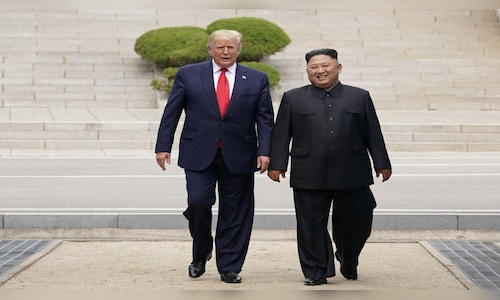In early 2019, US Navy SEAL Team 6 undertook a top-secret mission inside North Korea to install an electronic device capable of intercepting Kim Jong-un’s communications, according to reporting by The New York Times. The operation, which carried immense risks of sparking conflict with a nuclear-armed state, was directly approved by President Donald Trump.
The mission was intended to close a major intelligence gap. US agencies had long struggled to penetrate North Korea’s tightly controlled system, leaving Washington with little visibility into Kim’s intentions even as Trump pursued high-stakes nuclear diplomacy. Officials believed the newly developed surveillance device could deliver a rare stream of intelligence on Pyongyang’s leadership.
SEAL Team 6’s Red Squadron tapped for mission
The task was assigned to SEAL Team 6’s Red Squadron — the same unit that killed Osama bin Laden. After months of training with SEAL Delivery Vehicle Team 1, the commandos deployed from a nuclear-powered submarine in mini-subs, braving freezing waters before swimming ashore. But soon after landing, the mission unraveled.
A small North Korean boat appeared unexpectedly. Believing they had been spotted, the SEALs opened fire, killing two to three unarmed civilians believed to be shellfish divers. The commandos then aborted the mission, retrieved the bodies to conceal evidence, and escaped via submarine. The surveillance device was never planted.
The Trump administration never informed congressional intelligence committees about the operation — before or after it occurred. Legal experts told the NYT this omission may have violated federal law requiring congressional notification of covert actions. “This is exactly the kind of thing that would normally be briefed,” said Columbia Law professor Matthew Waxman, a former Bush-era national security official. Both John Bolton, then national security adviser, and Patrick Shanahan, acting defense secretary at the time, declined to comment.
Although internal Pentagon reviews concluded the SEALs’ actions were justified under rules of engagement, some military officials privately expressed concern over the pattern of overly complex, high-risk missions with mixed results. While the SEALs are credited with successes like the bin Laden raid, their history also includes botched operations in Grenada, Yemen, and Afghanistan that resulted in civilian casualties or mission failure.
The Biden administration later ordered an independent investigation, and in 2021 briefed select members of Congress on its classified findings, NYT reported. North Korea never publicly acknowledged the incident, though US satellites reportedly detected heightened military activity in the aftermath.
Ultimately, the failed mission highlighted the dangers of clandestine operations in North Korea, where any misstep risks not only mission failure but also broader escalation with a nuclear adversary.
Also Read: Thousands protest for a ‘Free DC’ on the fourth week of federal control in Washington
